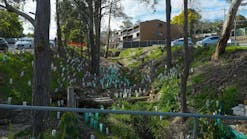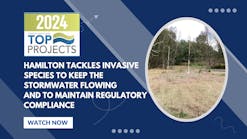In Texas, one of the greatest needs related to erosion control is to help small operations within the industrial multisector reach compliance for general permit work, says James Wilson. “They may have an active permit that’s not up to date, or they may be paying their annual fee but may not be in compliance,” he says. Client education is a passion for Wilson, the central Texas project manager for Houston-based Storm-Tex Services. Wilson provides guidance in a number of stormwater and erosion and sediment control tasks. Texans are quite protective of their land, and he’d like to help them be even more protective, Wilson notes. “You see more sediment control devices installed in Texas than erosion control devices,” he says. “You don’t see as much hydromulch and blankets to prevent the beginning stages of erosion. There is a lot of silt fence at the perimeters of the job site holding back what should have never have left in the first place.” Wilson likes to show his clients that being proactive is both cost effective and aesthetically pleasing. He was able to do so successfully when working in California, but had to adjust to different rules in Texas. Therein lies the problem, one he plans to address at the upcoming IECA conference. “It’s really important for national general contractors and national developers to know local environments-not just state specific, but county, city and MS4 specific,” he says. “There needs to be more education about forward-thinking practices, using the best management practices possible.”
What Led Him to This Line of Work
After earning a B.S. degree in construction management from Purdue University, Wilson worked in land development field for large homebuilders. While working in southern California, he noticed that many builders reticent to deal with the stormwater pollution prevention plan (SWPPP) pushed the task off to new employees. Ensuring subcontractor stormwater compliance became part of Wilson’s job responsibilities. Wilson took a job on the other side of the fence as an operations manager with one of his company’s contractors, an erosion control product installer. He became certified as a CPESC, CESSWI, Qualified SWPPP Practitioner (QSP), Qualified SWPPP Developer (QSD), and a Trainer of Record for the QSD/QSP. “It was a career path I enjoyed,” says Wilson. “I thought it was an opportunity to take the bull by the horns and be on the front page of an ever-increasing, ever-changing, regulated industry.” He left California to head back home to raise a family in Texas, start a directional drilling company and a youth golf program before taking on his present job. While working in the Texas construction field, Wilson observed that while Texas had stormwater regulations, it lacked enforcement. In that, he saw potential and opportunity.
What He Does Day to Day
Wilson works on business development for Storm-Tex Services and conducts training sessions for local municipalities, developers, and contractors. He does construction general permit and industrial general permit-related inspections, provides estimates, and develops SWPPPs. Wilson also attends a lot of trade shows, including IECA conferences and StormCon.
What He Likes Most About His Job
Wilson likes that each of his jobs -and each SWPPP-is different. “Getting to know your job and the SWPPP team and getting people educated for each job is different every single time. I thrive off of the difference,” says Wilson. He also enjoys helping people. “Most people, when you start dealing with them, have just received a notification from a municipality and they’re frustrated. Getting them from a point of frustration to a point of relaxation and performing well is awesome to me,” he says. He also helps through the Texas Commission on Environmental Quality (TCEQ) EnviroMentor program, which offers small businesses and local governments confidential assistance toward compliance without the threat of enforcement actions.







